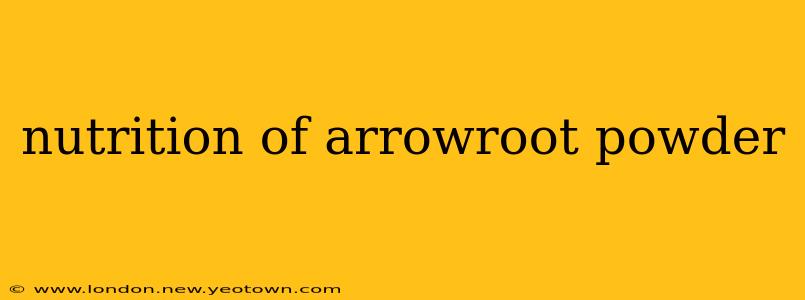Arrowroot powder, a fine white starch derived from the arrowroot plant's rhizomes, has quietly earned a place in kitchens worldwide. Often used as a thickening agent, it’s more than just a culinary tool; it offers a surprising nutritional profile, making it a valuable addition to a healthy diet. Let's delve into the fascinating world of arrowroot powder and explore its nutritional powerhouse.
What is Arrowroot Powder Made Of?
Arrowroot powder is primarily composed of carbohydrates, specifically starch. This starch is easily digestible, making it a suitable choice for individuals with sensitive digestive systems. Unlike many other starches, arrowroot is naturally gluten-free, making it a safe and versatile option for those with celiac disease or gluten intolerance. The process involves harvesting the arrowroot plant's rhizomes, washing, grinding, and drying them into the fine powder we commonly use.
Is Arrowroot Powder Nutritious? A Deeper Dive
While arrowroot powder isn't a nutritional powerhouse in the same vein as leafy greens or berries, it contributes in subtle yet significant ways. It's a good source of carbohydrates, providing energy for the body. Its nutritional profile is relatively simple, mainly consisting of carbohydrates, with negligible amounts of protein and fat. However, the lack of protein and fat doesn't diminish its value, especially when considering its role in specific dietary needs.
What are the vitamins and minerals in arrowroot powder?
Arrowroot powder isn't a significant source of vitamins and minerals. It does contain trace amounts of certain minerals, but these quantities are so small that they contribute minimally to the daily recommended intake. Its primary nutritional contribution lies in its easily digestible carbohydrate content and its gluten-free nature.
Is arrowroot powder good for weight loss?
This is a frequently asked question, and the answer is nuanced. Since arrowroot powder is primarily carbohydrates, consuming it in large quantities might not be ideal for weight loss. However, its use as a thickening agent in recipes can often replace higher-calorie alternatives, such as flour or cream, potentially contributing to a lower-calorie meal overall. Its role in weight management isn't direct but can be indirect through its use in healthier recipes.
What are the health benefits of arrowroot powder?
The key health benefits of arrowroot powder stem from its easily digestible nature and its gluten-free status. For individuals with digestive sensitivities or those following a gluten-free diet, arrowroot powder offers a valuable thickening alternative. Its gentle nature on the digestive system can be beneficial for those with conditions like irritable bowel syndrome (IBS).
Is arrowroot powder safe for babies?
This is a critical question, often searched by new parents. While arrowroot powder itself is generally considered safe, it's crucial to introduce it to a baby's diet gradually and under the guidance of a pediatrician. Always follow age-appropriate feeding guidelines and be mindful of potential allergies or sensitivities. It's not a primary source of nutrition for infants, but rather a potential thickening agent in their food.
What are the side effects of arrowroot powder?
Arrowroot powder is generally well-tolerated. However, some individuals might experience mild digestive discomfort, such as bloating or gas, if consumed in large quantities. Allergic reactions are rare, but possible. As with any new food, start with a small amount to assess tolerance.
Conclusion: A Versatile Ingredient with Hidden Nutritional Depth
Arrowroot powder might not boast a flashy nutritional profile, but its easily digestible carbohydrates, gluten-free nature, and versatility in the kitchen make it a valuable ingredient for many. Understanding its composition and potential benefits allows you to incorporate it thoughtfully into a healthy and balanced diet, appreciating its often-unsung nutritional contributions. Remember to always consult with a healthcare professional or registered dietitian for personalized dietary advice.

